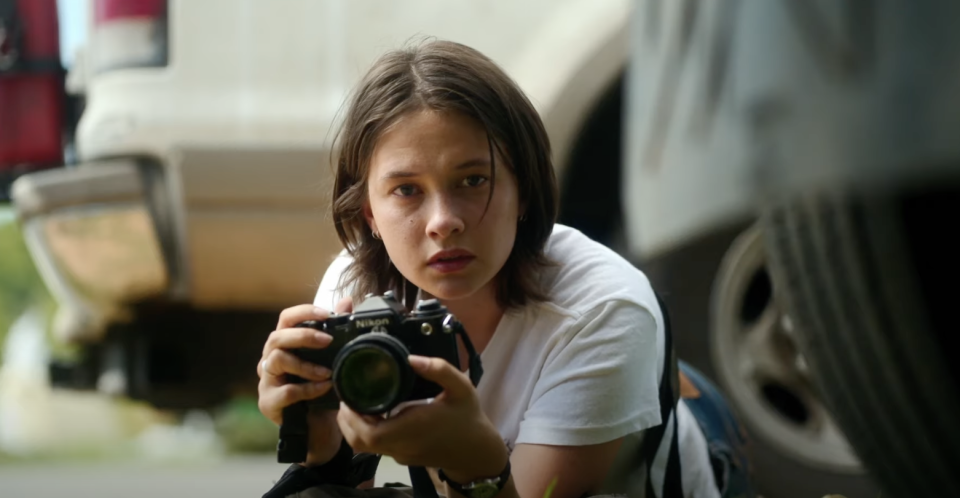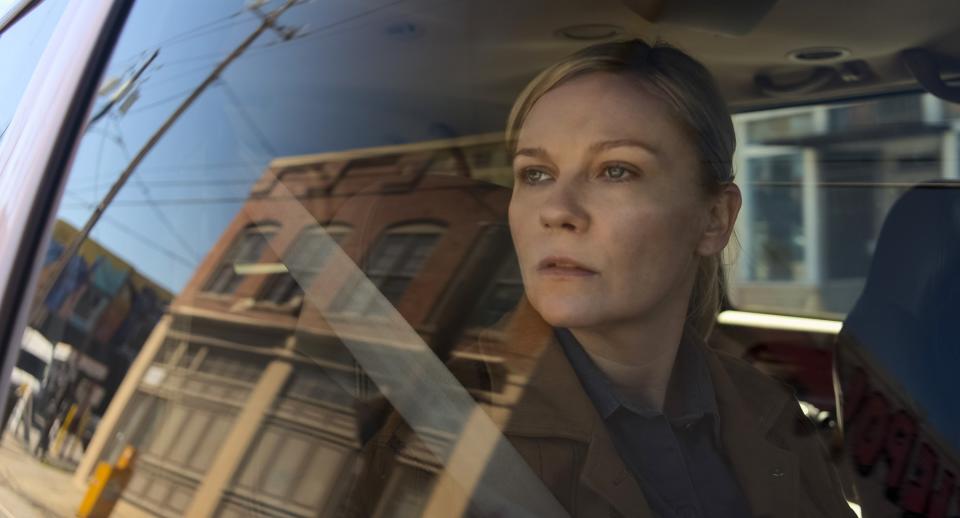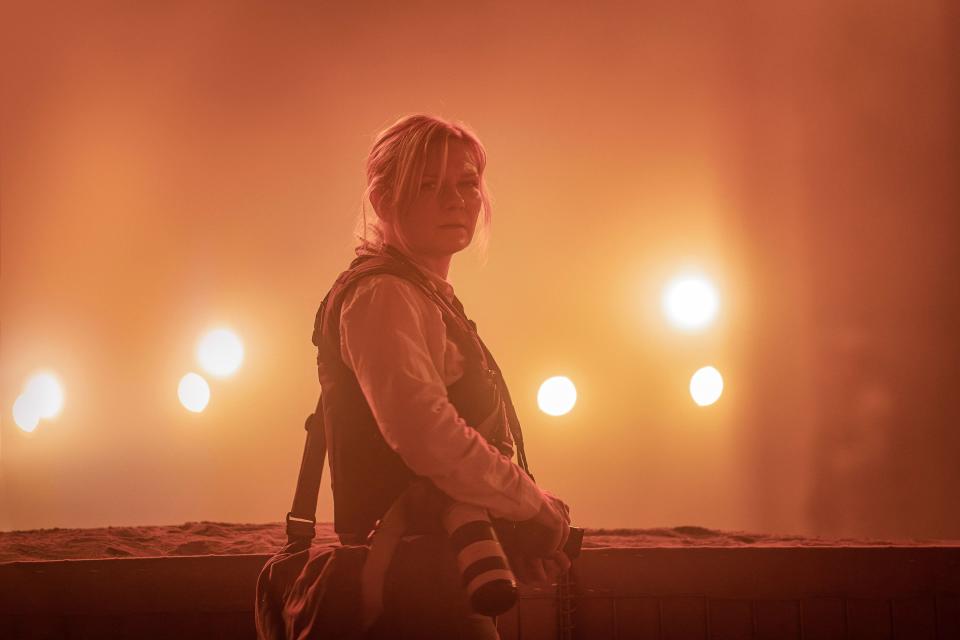The Anxiety and the Idiocy of ‘Civil War’: Three Writers Debate the Pros and Cons of Alex Garland’s Polarizing A24 Hit

The following is a spoiler-filled discussion about “Civil War” between IndieWire Film Editor Ryan Lattanzio, Editorial Director Kate Erbland, and Reviews Editor and Chief Film Critic David Ehrlich. IndieWire’s review of the film can be found here.
David Ehrlich: Before Kate, Ryan, and I saw “Civil War” in IMAX on a Thursday morning earlier this month (a very chill way to start the day), I had fully expected to spend the next few weeks chewing on Alex Garland’s still-pinned hand grenade of a movie about an ununited America — a movie that had already been met with an appropriately polarized reaction at every stage of its existence, and would continue to be raved about and read for filth on the internet in the time leading up to its spectacular first weekend at the box office. I expected my brain to be on fire by the time the screening was over, as it was after “Annihilation,” or that I would feel refreshingly unresolved about what I had just watched, as I did after “Men.”
More from IndieWire
Taylor Swift Ends 'Tortured Poets Department' with 'Clara Bow' - Who Was She?
Quentin Tarantino Is No Longer Making 'The Movie Critic' as His 10th Film
At the very least, I expected to be more viscerally afraid of what the future of this country might hold than I was before the lights went down. After all, Garland has dedicated his life to stories of disintegration, and the speculative collapse of the world’s greatest superpower would seem to be a perfect subject for a horror filmmaker who’s scared himself into thinking that he’s a provocateur. I had a lot of expectations for “Civil War” before I saw it, I just never expected that I would stop thinking about it the minute I finally did.
If Garland’s headache of a press tour for this movie has made anything clear, it’s that a certain amount of mental short-circuiting seems to have been intentional. The guy is fascinated by our failures of imagination, and by our refusal to redefine ourselves in the face of a growingly indefinite existence; his efforts to dramatize the space between where we end and the world begins have made him a compelling author of existential cautionary tales, even if sometimes in spite of himself.
Garland’s characters hold onto their self-images as if they were liferafts, and continue to cling to them even as they drown. He made a movie about a couple of handsome bozos who believed they could never be seduced by a sentient AI, and who maintained that belief right up until the minute it killed them. He made a movie about a team of brilliant women who entered an alien soap bubble with their own agendas, only to discover that even their DNA would soon be entwined. He made a movie that said #YesAllMen in the most literal terms he could possibly visualize on screen.
Now he’s made a movie about the fall of a country so blinded by its own exceptionalism that it can’t imagine a civil war happening here — despite the fact that one already has (it was kind of a big deal, you should read about it). Armed militias in the streets, mass graves along the sides of highways, air raids over the capital… these are things that only happen in other countries. Not here. We think that our Americanness will save us, but Garland suggests that our national identity is the wool over our eyes, and so he anchors his story to a motley crew of photojournalists who are determined to pierce that veil and/or die trying.
The event that first brings those people together is a suicide bombing in Brooklyn (Garland stops just short of showing avocado toast mashed into the rubble), which is such a pointed way of framing the movie’s political omnivorousness that I had to stifle a laugh. “Civil War” may have played to packed theaters across the country, but it feels made for — and targeted at — the people most likely to question its plausibility. Then again, as people who’ve read any film news over the last few weeks already know, Garland has repeatedly insisted that his movie doesn’t pick sides or privilege certain perspectives. I don’t think that’s true, but the lack of specificity between that opening blast and the climactic siege on the White House makes it easy for me to believe that he does.
In trying to tell a story that confronted all Americans where they live, Garland fell into the same trap that all of his other, better films have set for their characters: He convinced himself that “Civil War” could exist separate from the world that led to its creation. The result is a movie that operates at the same remove from reality as Kirsten Dunst’s character does when she takes a picture of the president on TV in the opening frames; she risks her life to erase the distance between her lens and her subject, but Garland refuses to take any such chances, even — or perhaps because — this project has drawn him so much closer to the real world than any of his previous work.
There’s a palpable hostility to Garland’s recent work, a naked frustration with our growing need for moral clarity at a time of unprecedented messiness, and I find it curious that he’s managed to grow more popular — or at least more prominent — while goofily fetishizing the same ambivalence that makes people so angry at his films. I was skeptical of the pre-release mockery that greeted the movie’s vision of a self-divided United States (Texas allying itself with California, etc.), but also optimistic that “Civil War” would do more to prey upon our failures of the imagination than it would to expose Garland’s own.
Alas, I couldn’t help but feel that “Civil War” is the first of his films that is a failure of the imagination. It certainly failed to capture my own. It left me with almost nothing to do hold onto, and in the rare moments when I’ve returned to the movie in the weeks since we saw it, my thoughts have exclusively focused upon the movie’s rhetorical ambitions and its place in Garland’s filmography; not the characters, or the work they do, or the country they’re dying to reveal to us. But our corner of the world has continued to buzz about “Civil War” since its SXSW debut, and the conversation is unlikely to quiet down now that the movie has earned A24 its best opening weekend ever. Truth be told, I find myself a lot more interested in how other people are processing the movie than I am in the movie itself, and so I wanted to check in with Kate and Ryan to see how “Civil War” has been sitting with them since we saw it. Did it leave a different aftertaste for you guys? Did you find anything in it to hold onto?

Ryan Lattanzio: In the weeks since seeing “Civil War,” I, too, have felt it evaporating from my brain more than a $50-million IMAX epic of this scale should. That’s to do with, however deliberate, the lack of establishing specificity. Trying to explain the film’s political world-building to someone who hasn’t seen the movie is like trying to map out your own dream, just tangibly out of reach. But that’s also to do with how banal and even familiar Garland’s images of the apocalypse tend to be. If you’re tuned into world news at all, you aren’t necessarily as shocked by, as you say, a suicide bombing in Brooklyn as Garland’s camera seems to be, or that the film wants us to be. It is fascinating, though, how his camera treats the United States as other Western movies (and often ones that valorize Americans) regard the Middle East.
There’s also the intentional blankness of the characters who don’t really have spectacular arcs, also by design, outside of Cailee Spaeny, whose rookie photographer goes from impressionistic to hardened over the course of a series of terrifying events. I don’t fault Garland for not quite being able to explain how his U.S. got to where it is — he said in our interview that he did create a backstory in earlier drafts of the script. If anything, it’s a reflection of a curious, searching filmmaker. Garland had similar press issues with “Men,” which birthed up ghoulish images of body horror to tell a sort of parable of #MeToo (a belated term nowadays but its anachronism is appropriate for what feels like a dully retro movie). He could not fully explain where his vision came from or where it was going or what it was trying to say. Nor should he have but apparently, for many people out there, he does.
Kate, you’ve said something before that I appreciate — that the characters of “Civil War” are almost obstinate in their stupidity at times. Do you think that’s going over well with audiences?

KATE ERBLAND: In the weeks leading up to the release of “Civil War,” it was the title I was most often asked about by-non media and movie types, mostly because they had the (understandable) reaction of thinking, why do I need to see this, when ::gestures to the world around them::? I’ll admit, I was initially interested in see how Garland set up his world and how we ended up there — again, California with Texas?? Florida on its own? — but when it became clear that he wasn’t going to be sharing that part of the story with us the audience, I let it go.
What I’ve held on to – and yes, thought about in the intervening weeks – have been two things: one of which you both mentioned and I’ll get to next, and the other, which Ryan pointed out and that has really become my ballast in understanding and liking the film. It’s the idiocy (complimentary!). Throughout the film, we see characters do things that seem deeply dumb: like Cailee Spaeny’s Jesse getting her kicks by sliding from moving car to to moving car, “Footloose” style; or our hard-bitten war reporters Lee (Dunst) and Joel (Wagner Moura) hoping to talk things out with Jesse Plemons’ unhinged rebel (talk things out?!?); and even a last act sequence that sees allegedly season soldiers taking some big, limo-sized bait outside the White House. These people make mistakes. They make bad choices. Not all of this makes sense, because people don’t. And do you know when people really don’t make sense? When they’re exhausted, emotional, confused, and beaten down – when they’re in the middle of a war. Take that idea and stretch it, and I think it offers a way of seeing the film that’s a bit more charitable and open. Maybe we don’t need to know how these characters ended up in this battle, but we sure as fuck know how it feels.
And, as both David and Ryan mentioned, just using America — from Brooklyn to the backwoods to DC — as the setting for a civil war is evocative and compelling. These days, it’s far too easy to turn a blind eye to unrest happening vaguely over there, but when you American spaces and American iconography reduced to rubble, you inevitably have to consider what this would actually be like. It’s not the NYC blow-up that go to me, it was the bombed out gas station that looks just like a million country gas stations I’ve driven by, or the empty mall parking lot home to a downed helicopter, a DC blown to hell and back. I don’t need to know the answers to how Garland’s characters ended up where they are, because I know how it would feel, and that’s terrifying enough to make me a “Civil War” fan.

DAVID ERHLICH: Kate, you wrote about how these characters are in the middle of a war, and that’s obviously true, but I’m interested in what that means for them in the context of a movie where everyone seems to be choosing their own level of participation. Our heroes run toward the front lines because that’s what they do or have always done — some get off on the adrenaline of being close to the action, while others are more solemn and beaten down about the whole adventure, but all of them feel the need to show a disbelieving world what’s happening.
Garland’s heroes, or whatever you want to call them, stand in stark contrast to so many of the other people he invokes on their journey. Several of the characters talk about their parents, who live on a farm somewhere and do their best to pretend that the country isn’t on fire. And then there’s that one town in Twilight Zone, USA where the shops are open as if it’s just another day in America — as long as you don’t look up at the snipers on the rooftops above Main Street. Even Jesse Plemons’ thoroughly terrifying White Nationalist soldier is keeping a certain distance from reality; the reality of what he’s done (and is trying to bury in a mass grave), and/or the reality that his kind of Americans are less than 24 hours away from losing the war.
Some of these characters — the girl at the clothing store and the unseen parents in particular — made me think of “The Zone of Interest” in a way. Maybe not with quite the same moral implications (there’s a difference between ignoring a genocide and refusing to participate in a civil war), but I was talking earlier about how Garland is fixated on the difference between “us” and “them,” ourselves and the other, and so I found myself stuck all the same on how we practice distancing as a defense mechanism against our own cognitive dissonance.
I wasn’t compelled by any of the specific photojournalists in the movie, much as I love all of the actors who play them, but I was intrigued by how Garland measures their closeness to the conflict (which is often but not always mediated by the cameras they carry), and by the half-hearted way he measures the toll that it takes on them. To me, “Civil War” seems intent upon saying OPEN YOUR EYES AND CONFRONT THE POSSIBILITY THAT SHIT LIKE THIS COULD GO DOWN IN YOUR BACKYARD, but it also recognizes the fatal dangers of staring at the truth too closely. I suppose the “idiotic” photojournalists are painted like heroes, and that “Civil War” was meant to be something of a tribute to them, but is the impact of that tribute lessened by a movie that keeps its own stubborn distance from reality?
RYAN LATTANZIO: Alex Garland’s clear reverence for journalism has rarely been matched in a 21st-century movie outside of “Spotlight.” But I was a little confused (and asked about this in our interview) by what I thought was a rather utopian portrayal (up to a point) of journalism in dystopian times. How do Lee et al get carte blanche to waive through hellfire by virtue of brandishing a press pass? There were several times when they probably should’ve been squashed, or at least should try to conceal the giant letters PRESS emblazoned on the scrubby truck they drive down the coast in. Garland’s father was a political satirist, but he’s looking at the profession a little bit from the outside in. (Of course, isn’t that filmmaking?) Wouldn’t the media — to clarify, media that isn’t sensationalist gonzo journalism — pretty much have collapsed along with the rest of the country?
There are complaints that “Civil War” focuses its carnage too explicitly, or too much with a one-track mind, on the deaths of people of color. That, to me, was not what was reflected onscreen, which is a free-for-all for the deaths of all colors and kinds. Obviously, part of the backdrop for what’s left America so riven is a race war, and you can trace the silhouette of our current political moment around Garland’s original, offscreen idea of a schism between California/Texas and a Florida alliance. That Garland doesn’t explain the recent-past particulars that led to an America on fire opens up the potential for the audience to project their fears and anxieties (or frustrations) onto the movie, and so I can see where that criticism comes from. There’s a Middle Eastern man being burned alive in a flashback, where the camera is imitating Lee’s eye (or her own camera’s) as she captures the image. Then there is of course the now already infamous scene with Jesse Plemons as a white nationalist who kills Joel’s colleagues Tony (Nelson Lee) and Bohai (Evan Lai), both reporters from Hong Kong who pay the worst possible price because of their race.
It’s an idea heavily on Garland’s mind though probably not explored probingly or trenchantly enough for swaths of the audience. Race then becomes more one idea in a soup of them. While I like “Civil War,” it’s maybe more interesting to hear the negative responses to the film, and this is where that issue has come up. A group of friends of mine in Los Angeles saw it opening night and all uniformly hated it because they felt like it had nothing to say. But maybe “Civil War” is maybe just not saying it (whatever it is) as loudly as we’re used to.
Best of IndieWire
The 22 Best Spy Movies, from 'Enemy of the State' to 'North by Northwest'
The 12 Best Thrillers Streaming on Netflix in April, from 'Fair Play' to 'Emily the Criminal'
Quentin Tarantino's Favorite Movies: 61 Films the Director Wants You to See
Sign up for Indiewire's Newsletter. For the latest news, follow us on Facebook, Twitter, and Instagram.


